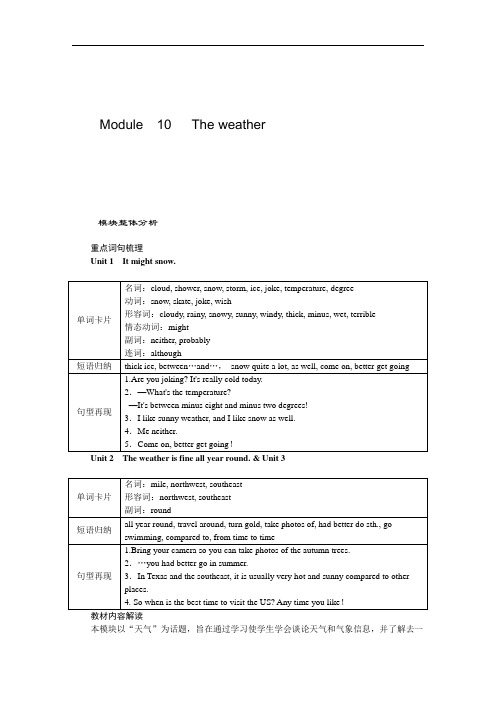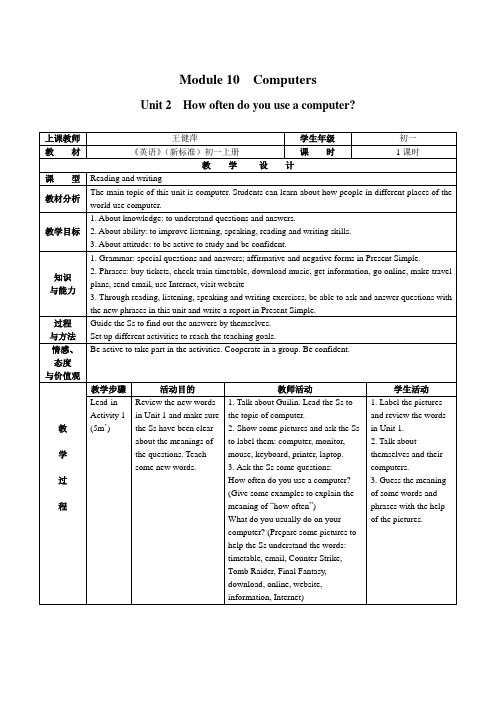八年级英语 module 10. computers外研社知识精讲
- 格式:doc
- 大小:53.00 KB
- 文档页数:8

2021~2022学年新课标外研版初中英语学习讲义八年级下学期Module 10课文知识点总结笔记Module 10 On the radio语法:宾语从句的时态问题一、宾语从句的时态与主句的时态一致:当主句用一般现在时,宾语从句的时态根据自身的时间状语选择时态。
当主句是一般过去时,从句的动作发生在主句的谓语动词之前,从句用过去完成时。
当主句是一般过去时,从句的动作还没有或将要发生,从句用过去将来时。
Eg: I don’t know whose book this is.He said that he had just bought a book.He said he would go there again.二、时态不一致:主句是一般过去时,下列几种情况从句时态不变1.宾语从句表示的是客观事实、科学真理、格言或其他不受时间限制、影响、客观存在的事物时,依然用一般现在时Eg: He said the earth goes around the sun.2.宾语从句解释、表达科技内容时,或表达一种反复出现或目前习惯性的动作时,仍用一般现在时Eg: He said he takes a walk after dinner every evening.3.宾语从句的谓语动词所表示的动作在转述时仍在继续,表示此刻仍存在的状态,从句的时态仍用现在范围内的时态。
Eg: She told me the other day that she is only eight.4.从句中有具体的时间状语,动作是发生在主句动作之前,仍用一般过去时,不改为过去完成时Eg: He said that he was born in 1998.1.Thank you for… = Thanks for + 名词、代词、动词ing因…而感谢2.show… around = take… around= take… to visit带…参观Eg: Can you show/ take us around your factory?= Can you take us to visit your factory?e this way 这边请4.be on (灯等)亮;(电影等)上映5.mean to do sth. 想或企图做某事mean doing sth. 意味着做某事mean (v.)--- meaning (n.) 意思Eg: I had meant to visit you, but I was too busy.My new job will mean travelling all over the world.6.on air 正在广播Eg: We will be on air in ten minutes.7.avoid doing sth. 避免做某事avoid 后接名词、代词或动名词Eg: You should avoid making the same mistakes.avoid (v.) 回避;避开Eg: Everyone seemed to be avoiding him.avoid(v.) 逃避Eg: You should avoid over-spending.8.make some noise 制造噪音9.the latest national and international news 最新的国内、国际新闻10.get crazy 令人发狂be crazy about…热衷于;迷恋于like crazy 发狂似的;极度地go crazy变得疯狂drive sb. crazy 让某人疯狂11.keep doing sth. 不断做某事12.do interview with sb.= interview sb. 采访某人interview --- interviewer 采访者/ interviewee被采访者13.keep quiet 保持安静14.if (1) “如果”引导条件状语从句,如果放在主句前,从句要用逗号与主句隔开Eg: I won’t go by plane if it rains tomorrow.If you want to go, please tell me.(2)if所引导的条件句,要遵循“主将从现”原则Eg: If it doesn’t rain tomorrow, we’ll go to the Great Wall.(3) if引导的条件句,当条件成立必然有某种结果时,主句和从句用一般现在时Eg: If you drop a glass, it breaks.(4)if “是否”时,不用主将从现Eg: I don’t know if it will rain tomorrow.15.against (prep.) “以…为竞争对手;与…对抗”后接名词、代词、动词ingEg: Yesterday we played against a very strong team and we won.反对;对抗Eg: My father is against my plan.16.t he end of……的尾声at the end of…在…末端by the end of…直到…为止in the end 最后;最终1.look down at…低下头看look down upon 瞧不起2.Shouldn’t you be at school?你不用上学吗?这是一个否定疑问句,用于表示惊奇。


外研版英语八年级上册M o d u l e10-知识点汇编(总5页)页内文档均可自由编辑,此页仅为封面Module10 知识点汇编一、重点单词:cloud 云,云雾storm 暴风雨rainy 多雨的sunny 晴朗的skate 滑冰ice 冰might 可能,也许minus 负的,零下的although 然而,尽管terrible 使人烦恼的probably 或许,可能shower 阵雨cloudy 多云的snowy 多雪的windy 多风的thick 厚的joke 开玩笑temperature 温度degree 度,度数wet 下雨的,湿的wish 但愿,希望核心词汇讲解1.cloud / klaʊd/ n. 云,云雾The sun went behind a cloud. 太阳躲在了一朵云的后面。
【拓展】cloudy 多云的2.snow / snəʊ/ n. 雪,雪花;v.下雪It is snowing. 正在下雪。
【拓展】天气类词汇小结:snow 雪 snowy 下雪的wind 风 windy 有风的sun 太阳 sunny 晴朗的rain 雨 rainy 下雨的3.skate / skeɪt/ v. 滑冰Can you skate 你会滑冰吗【拓展】同根词:skating n.滑冰skater n.滑冰的人4.joke / dʒəʊk/ v. 说笑话,开玩笑You’re joking!你是在开玩笑吧!【拓展】固定搭配:tell jokes 讲笑话5.temperature / 'temp(ə)rətʃə/ n. 温度The temperature has risen (by) five degrees. 温度升高了五度。
【拓展】固定搭配high temperature 高温low temperature 低温take one’s temperature 量体温6.neither / 'naɪðə/ adv./adj/pron. 也不She doesn’t like Mozart, and neither do I.她不喜欢莫扎特,我也不喜欢【拓展】all: 三者或三者以上both: 两者都,可以和and搭配either: 两者中的任何一个,可以和or搭配neither: 两者都不,可以和nor搭配none: 三者或三者以上都不,可以和of搭配7.wish / wɪʃ/ v. 但愿,希望; n. 愿望I wish to speak to the manager. 我希望能跟经理说话。

Module 10The weather模块整体分析重点词句梳理Unit 1It might snow.单词卡片名词:cloud, shower, snow, storm, ice, joke, temperature, degree动词:snow, skate, joke, wish形容词:cloudy, rainy, snowy, sunny, windy, thick, minus, wet, terrible 情态动词:might副词:neither, probably连词:although短语归纳thick ice, between…and…,snow quite a lot, as well, come on, better get going句型再现1.Are you joking? It's really cold today. 2.—What's the temperature?—It's between minus eight and minus two degrees! 3.I like sunny weather, and I like snow as well. 4.Me neither.5.Come on, better get going!Unit 2The weather is fine all year round. & Unit 3单词卡片名词:mile, northwest, southeast 形容词:northwest, southeast副词:round短语归纳all year round, travel around, turn gold, take photos of, had better do sth., go swimming, compared to, from time to time句型再现1.Bring your camera so you can take photos of the autumn trees.2.…you had better go in summer.3.In Texas and the southeast, it is usually very hot and sunny compared to other places.4. So when is the best time to visit the US? Any time you like!教材内容解读本模块以“天气”为话题,旨在通过学习使学生学会谈论天气和气象信息,并了解去一个地方旅游的最佳时间。


外研版英语初二上册Module10单元知识点归纳总结(详细版)Unit1 It might snow.1.用于确信句中表示推测的情态动词must>may>might用于否定句中表示推测can’t (不可能) >may not(也许不) >might notIt may/might (也许) be cold tomorrow.=It will probably/possibly be c old.= Maybe/Perhaps it will be co ld tomorrow.It’s possible that it will be c old tomorrow.(否定句)It may/might not be cold.It must(确信)be cold.(否定句)It can’t be cold.2.weather forecast/report for the next 24 hours(感叹句)What fine/bad/terri ble weather!What a fine day! (注意weath er是不可数名词,day是可数名词) How terrible the weather is!3. thick/thin ice4. freezing cold 刺骨的freeze-froze-frozen 结冰,冰冻5. You must be joking! 你确信在开玩笑joke v. & n.tell jokes讲见笑play jokes on sb.=make fun of sb.开某人的玩笑6. —What’s the temperature?—It’s between minus five and (plus) one degrees! / It’s min us five to one degrees!零下5度到1度之间。
Xi’an will be cold with a te mperature of/from minus one to (pl us) four degrees.It’s sunny with a temperature between…and…The lowest temperature is min us five degrees (或five degrees bel ow zero) and the highesttemperature is one degree.stay above zero fall bel ow zero7. What’s the weather like …? = How is the weather …?(shower) showery stormy rai ny icy foggy snowy cloudy windy stormy wet-dry hot-cold cool-warm humid damp潮湿的8. although = though conj. 然而; 尽管, 引导的从句能够与but, however 互换,但不能与它们连用, 可与yet, still 连用。
module10《computers》unit1教案(外研社初一上)2Teaching aims:1.To get to know the basic words about computers.2.To understand the dialogue about how to write homework on the computer.3.To learn to how to give instruction.Key Structures:1.Sequence adverbs2.〝wh〞question in present simpleTeaching procedures:Step 1: Warming-upT: What do you usually do on Sunday?Ss: Give answers.T: Well, I often play computer games, too. Except playing computer games on the computer, I also watch TV on the computer. What else do you usually do on the computer?Ss: Give answers.T: Do you often do your homework on the computer?Do you know how to do homework on the computer?Step 2: VocabularyT: OK, let’s learn 〝Unit 1 How do I write homework on the computer?〞First, let’s learn the parts of the computer, please look at the pictures on the screen.( Show the pictures )What’s this?Ss: A computer.T: How many things are there in a computer?Ss: Give answers.( Teacher has the students learn the parts of the computer, then play a small game, let Ss have a word competition, let them speak out the English words quickly as they see the words on the screen.)T: One, two, three… So, there are five things in a computer. Next, let’s learn one by one.Do you know what it is? Please read after me.(In the first time, T has the whole class read together, then, let Ss read it one by one)Step 3: Words gameT: Can you remember these words? Let’s check.(T shows the pictures of the parts quickly, having Ss speak out the words quickly in the groups.) T: I will show you the picture of the parts, you must speak out it quickly. The one can speak out quickly and correctly will get on point.Now the whole class do it first, then I’ll ask some Ss to play this game.Step 4: Reading & ListeningT: So everyone should remember these words, but do you know how to use these parts to do homework on the computer?Let’s listen to the tape about the text, then fill in the table on the screen. First, le t’s look at the table on the screen.(Show the table to the Ss)(With the help of this table, have Ss know the general meaning of the text easily & better. Let Ss finish it in a group of four)T: Well, look at the table, after the first listening, please find out the answers of the blanks in a group of four, do some group-work.(After the first listening, fill in the table, then, let Ss read the table after T)Step 5: Speaking & Pair workAccording to the table, have Ss practice & talk about how to write homework on the computer. --How do I write my homework on the computer?--First…--What do I do next?--Next…--What do I do then?--Then…--What do I do finally?--Finally…(First, let Ss read the structure after T, then practice by themselves, check their work at last)Step 6: WritingAt last, in order to have Ss master the text better, let them do some writing practice. Put the instructions in the correct order.Then check the answers together.Step 7: Homework1) Recite the vocabularies in Activity 1.2) Talk about how to write homework on the computer with your classmates.。
Module 10. The weather一、主题:天气(Weather)二、必背单词名词:cloud云;云雾shower阵雨storm暴风雨ice冰temperature温度degree 度;温度mile英里动词:skate滑冰might可能;也许wish但愿;希望形容词:cloudy多云的rainy多雨的;下雨的snowy多雪的;下雪的sunny晴朗的windy 多风的;刮大风的thick厚的minus负的;零下的wet下雨的;湿的terrible使人烦恼的;可怕的副词:neither(某人或某物)也不probably或许;可能round围绕地连词:although然而;尽管兼类词:snow n.雪v.下雪joke v.说笑话;开玩笑n.笑话;玩笑northwest n.西北adj.西北的;朝西北的southeast n.东南adj.东南的;朝东南的三、常用短语1、on the lake 在湖上2、between…and… 在………和………之间3、minus two degree 零下2度4、sunny weather 晴朗的天气5、as well 也6、come on 快点7、at least 至少8、the best time 最佳时间9、travel around 到处旅行10、start to do sth. 开始做某事11、turn gold 变成金黄色12、take photos of… 给…拍照13、all year round 常年,一年到头14、swimming clothes 泳衣15、in the northwest 在西北部16、bring…with… 随身携带17、compared to 和……比较18、from time to time 有时;间或19、on the southeast coast 在东南海岸20、find one’s way 找到路21、come out 出现;露出22、arrive in 到达四、重点句型1、问答温度的句型:--What‘s the temperature?--It’s between minus eight and minus two degrees !2、询问和描述天气的句型:--What‘s the weather like in America in winter, Betty ?--It’s snowy in New York in winter.3、表示推测的句型:(1)And it’s cloudy too, so it might snow.(2)…you may want to travel around.4、表示虚拟语气的句型:I wish I were in Australia now,5、表示建议的句型:……you had better go in summer.五、模块语法情态动词may和might的用法(It might snow./ Bring a map because you may want to travel around.)Module 10.The weather详细笔记1.cloud云;云雾cloud名词,意为“云;云雾”,其形容词形式为cloudy,意为“多云的”。
module10《computers》全模块教案1(外研社初一上)NEW STANDARD ENGLISHBook 7A Module 10Computers浙江省嘉兴市海盐县武原中学七年级备课组朱惠芳,施重佳一.教学内容分析本模块的话题是让学生了解一些电脑方面的知识及如何使用电脑。
语法结构是一样现在时的专门疑咨询句学习。
词汇要紧是与电脑有关的单词。
上网是学生感爱好的活动,借助这一话题展开讨论,通过讨论让学生把握一样现在时专门疑咨询句的结构与差不多用法。
二.教学目标1.认知目标2.技能目标3.情感态度,文化意识1.认知目标熟练把握有关电脑的词汇及用语,把握一样现在时的用法,领会并熟悉把握/t∫/ 的发音特色。
要求学生贴近生活,结合实际中的电脑的有关知识加以学习。
2.技能目标要求学生能听明白有关电脑方面的简单词汇;听明白一样现在时的专门疑咨询句;能就电脑的使用进行简单的咨询答;能读明白差不多句序及咨询答;依照阅读内容能修改有错误信息的句子,并能用but连接句子;同时也能简单表述运算机的使用。
所有这些要求学生多听,多讲。
多练,在练中加深明白得。
3.情感目标通过学习,要求学生提高学习电脑和英语的爱好,促进学生适应时代的进展,进一步培养学生的良好情感。
三.教学知识重点重点词汇1有关电脑的词:computer,keyboard,monitor,mouse,printer,document,laptop, website,information,Internet2.动词:switch,use,click,save,download,check3.副词:first,next,finally,then,sometimes,again4.其它:box,online,train,timetable,London,kind重点句型1. How do you open a new document ?2.Do you often go online ?3. What do you usually do on your computer ?4. He checks the train timetable but he doesn’t buy tickets .交际用语1.What’s the mouse ?2.What do I do next ?3.How do I print it ?4.Do you have a computer at home ?四.教学理念:任务型语言教学以〝电脑〞这一话题为主线,采纳任务型语言教学途径,兼顾交际功能和有关一样疑咨询句的语言知识结构的学习,以一种循序渐进的交际性的学习程序引导学生学会运用那个语言知识有目的地做情况。
八年级英语Module 10. Computers外研社【同步教育信息】一. 本周教学内容:Module 10. Computers二.重点、难点:1. 序数词的用法2. 有无定冠词的短语3. 本模块的动词短语总结三.具体内容:1. keyboard 上的英语单词Esc,取消键Backspace,回退键Tab,制表键Caps Lock 大小写开关键Num Lock 小键盘开关键Enter 回车键Shift 换档建Insert 插入键Delete 删除键2. Open a new document.open V. 反义词closeopen adj. 反义词closedeg.Please open the window.Please keep the windows open.The shop is closed now.3. How do I save the document?save v. 保存Save the rest of the food for tomorrow.把剩下的食物留着明天吃。
Will you please save a seat for me?4. First, connect the monitor to the computer.序数词:first, second, third, fourth, fifth, sixth, seventh, eighth, ninth, tenth, eleventh, twelfth, thirteenth,…..twentieth, twenty-first, twenty-second, twenty-third, ……thirtieth….hundredth, thousandth,…序数词顺口溜基变序有规律,多数词尾加-th;一二三特殊记,词尾字母t, d, d;八减-t,九去-e,词尾-ve用-f 替;遇到整十来结尾,一定将y 变为ie;要是遇到几十几,个位变序就可以。
序数词表顺序,词前需带定冠词;他们缩写记清楚,基数后面两字母。
5. Do you usually use a computer at school?at school 求学,上学at the school 在学校at table 在吃饭,at the table 在桌旁go to school 上学go to the school (因事)去学校in class 在课堂上,in the class 在这个班里in bed 卧床,in the bed 在床上in hospital 住院,in the hospital 在医院6. 动词短语总结switch on the computer 打开电脑connect the monitor to the computer 把显示器和电脑连上write my homework on the computer 在电脑上做作业open a new document 打开一个新文件use the mouse 用鼠标click “new document”点击“新文件”save the document 保存文件write a name for it 给它起个名字print the document 打印文件download music from the internet 从网上下载音乐play games 打游戏send emails and photos 发电子邮件和照片write a novel 写小说check the train timetable 查列车时刻表buy tickets 买票visit my website 访问我的网站get information for my lessons 查询信息来备课go online 上网make travel plans 制定旅行计划check your spelling 检查你的拼写7. KEEP YOURSELF SAFE ON THE INTERNETThe Internet opens a new world for all of us. We can shop, plan our travel, send pictures to our friends, talk with friends and even read our class plans. Many people think the Internet changes our lives a lot. But do you know this new way gives us some problems as well? There are some tips to keep ourselves safe on the Internet.Mary: I never give my real name, address, or telephone number to anyone. If someone asksme for my information or passwords, I don’t talk with him or her.Tony: I close the conversation at once if I feel bad and tell my mum and dad about it.May: I always follow the rules that my parents make for me when I am online.Tom: I only give my email address to my family and my friends.Eva: There are some chat rooms for kids on the Internet, and I only chat in these chat rooms.John: I always use a nickname, and never use my real name on the Internet.Lucy: If I want to send the pictures of myself to a net friend, I tell my parents first. They can give me many good ideas.Lily: I never put the pictures of my family members, friends or myself on the Internet.Polly: If I want to download something, I ask my parents first.【典型例题】1. With the help of computers, news can ________every corner of the world.A. reachB. arriveC. getD. come答案:A解析:题目的意思是“到达世界的每一个角落”,reach, get to, arrive in(at)都表示到达。
2. What would you like to _________ us about your hometown?A. speakB. talkC. sayD. tell答案:D解析:speak to sb. ,talk to sb. / talk with sb. / talk about sth. ,say 后接具体内容/ 或say to sb. , tell 接双宾语:tell sb. sth.3. __________ does your sister live in?A. WhereB. WhenC. HowD. Which city答案:D解析:句中有in,所以缺少宾语,宾语只能由名词或介词来充当,所以不能选疑问副词where。
4. Now stop _________. Let’s begin our meeting.A. to talkB. talkingC. to talkingD. talk答案:B解析:stop +doing 做了某事,stop to do 还没做某事5. We ________ a basketball match on weekends.A. usually haveB. have usuallyC. usually hasD. has usually答案:A解析:频率副词在句中的位置:be动词、助动词、情态动词后,实意动词前。
【模拟试题】(答题时间:60分钟)一. Choose the best answer1. His brother is a computer _________ and knows ________about computer.A. fun, a lotB. fun, muchC. fan, a lotD. fan, many2. -________ will you finish your homework?-In half an hour.A. How longB. How soonC. How oftenD. What time3. Let’s ask Jim about the Internet. He knows __________about it.A. a fewB. fewC. a littleD. little4. Do you know how to find information about mobile phones _______ the Internet?A. atB. onC. fromD. in5. Don’t forget to shut ________the computer when you leave.A. downB. offC. fromD. away6. Please send an E-mail to me as soon as you ___________Seattle.A. arriveB. reachC. got toD. come7. -________ ?-He is a worker.A. What does he doB. What is heC. How does he doD. A and B8. Linda often _________ her homework in the evening, but she _______ TV this evening.A. does; watchesB. is doing; watchesC. does; is watchingD. is doing; is watching9. —Have you got _______ E-mail address?—Oh, yes, mine is ujb80@.A. theB. anC. aD. /10. Librarians must be ________ to people.A. friendlyB. friendC. quietD. happy11. Kate is good at singing. She sings very______.A. goodB. niceC. wonderfulD. well12. -________is he at home?-I think he is ill.A. WhereB. WhichC. WhatD. Why13. Why ______ me earlier?A. don’t tellB. not tellingC. not to tellD. not tell14. Please give me _________.A. some papersB. any paperC. two pieces of paperD. two piece of paper15. I’m going to help my mother _______ the clothes.A. washesB. washsC. washingD. wash16.-What ________that boat look like?-It ________ like a duck.A. do, lookB. does, lookC. does, looksD. is, is17. We don’t ________ any classes on Sunday.A. haveB. playC. doD. be18. We usually do _______ homework in the evening.A. theirB. hisC. herD. our19. I want to use the computer. Can you ______?A. switch it onB. switch on itC. switch it offD. switch off it20. School ________ at 8:00.A. startB. to startC. with startD. starts21. I eat breakfast at half ________ six.A. ofB. toC. atD. past22. Rick can use the computer _______ Bob can’t.A. andB. orC. butD. so23. I often do my homework _______ the computer.A. inB. toC. onD. at24. -_______ do you use a computer?-Usually.A. How manyB. How farC. How oftenD. How long25. I often get some information _____ my lessons on the Internet.A. withB. /C. toD. for26. I don’t use the Internet _________send emails.A. andB. withC. orD. for27. I visit some English-learning websites_______ the weekend.A. toB. atC. inD. /28. They often ________TV in the evening.A. watchB. be watchC. watchesD. to watch29. I often go online and use ________ to do my homework.A. the InternetB. the penC. the pencilD. the exercise book30. -________ does he do next?-Click the document.A. WhereB. HowC. WhatD. How many二. Fill in the blanks.1. I’d like to have a c__________, because it is very useful.2. S______ the document, and then we can find it next time.3. People usually use the m________ to open the new document.4. Remember the t________, and don’t come late.5. There are no lessons at the w_______.三. Complete the sentences.1. 美国青少年通常利用网络来做作业。